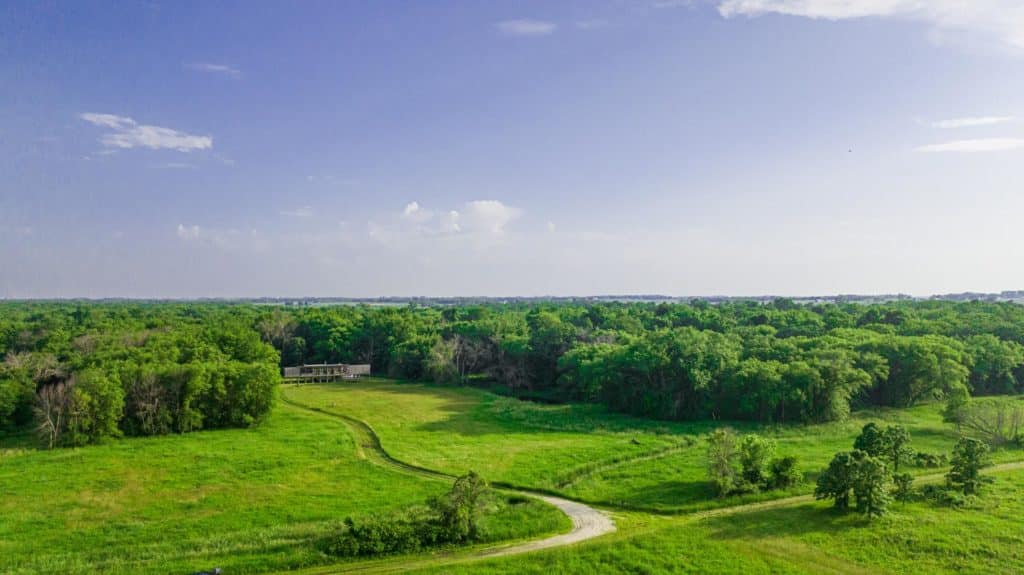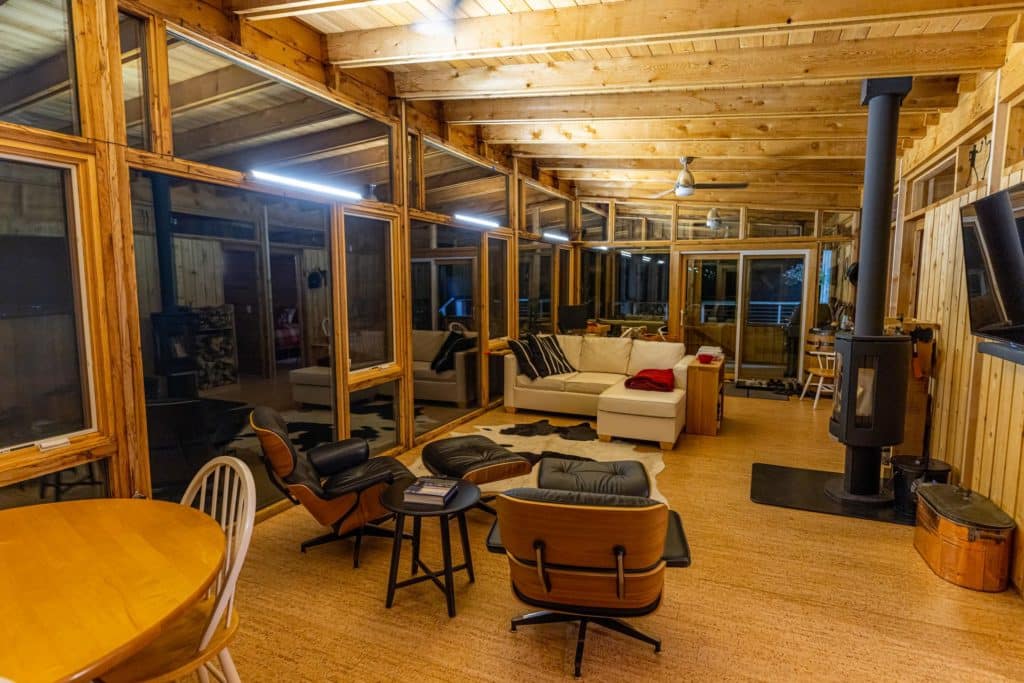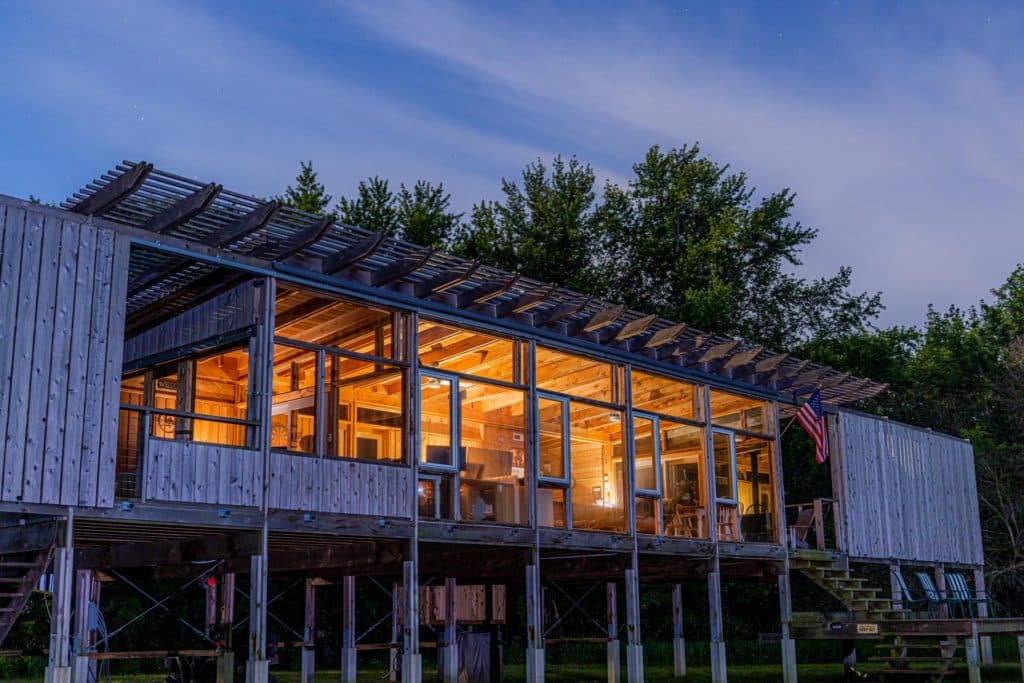
MENUMENU
TALK TO AN EXPERT
Special Hours: 7AM – 6PM PST
TALK TO AN EXPERT
Special Hours: 7AM – 6PM PST
Off-grid living certainly isn’t anything new. In recent years, there’s been a fresh burst of interest in off grid life and its meaning. Still, many may be intrigued by the idea but uncertain of what it entails. So what does off grid mean, and what are the benefits of living without the grid? Let’s take a closer look.

There are various degrees of living off grid, meaning there’s no single definition. At the most basic level, all off grid homes are designed to function without using at least some traditional utility infrastructures, like electric lines, public water lines, and more.
Some off gridders take the lifestyle a step further, growing their own food to reduce or eliminate their reliance on traditional grocery stores and supply chains. In the most extreme cases, ultra off grid enthusiasts may make their living solely with their own hands and tools, giving up traditional employment and community life.
The reasons for going off grid are as diverse as the people who do it. Some decide to go off grid because they love nature. They want to be as close as possible to the natural world. However, living in these remote and unspoiled spots often requires off grid systems for survival.
Others may be looking to save money by eliminating many of their housing and utility costs. Still, more off gridders may want to build a more self-sufficient life, whether because of concerns over traditional infrastructure or simply a desire to rely on no one other than themselves. Of course, some off grid livers don’t particularly enjoy being around people and have taken to the lifestyle as a way to be left alone.

One of the biggest benefits of living off grid is also one of the most obvious: self-sufficiency and meaning. Just look at potential blackouts in California due to electricity supply issues or long-term power outages along the Gulf Coast from hurricanes and tropical storms. Trouble in cities like Flint, Mich., and Jackson, Miss., shows how vital it is to have a reliable clean water supply.
Meanwhile, the natural disasters of recent years show just how precarious our supply of food and other necessities can be. Off grid life helps insulate you from serious worries others must deal with.
Over the long term, living this way can also save you money. Those with an adequate off grid setup will have no utility bills, reduced food costs, and likely a far cheaper cost of living. By eliminating these expenses, which can take up most of your budget, off gridders can quickly grow their wealth. They can also change their job to something they find more meaningful, even if it requires a pay cut.
Finally, don’t forget about the advantages of developing a closer connection to nature, as many off gridders do. In addition to the many physical benefits of being more active, research has also shown that exposure to green spaces improves cognitive function, mood, and general mental health.
Unfortunately, living off grid does not mean it’s not all sunshine and roses. Compared to typical “grid” lifestyles, you’ll need to do a lot more work and have much more knowledge simply to accomplish the basics.
→ Learn the 5 Biggest Challenges of Living Off The Grid.
For example, most people flip on a light switch without thinking about where the power comes from. Off grid individuals need to establish their own independent power generation system that can produce enough juice for their needs.
Fortunately, technology these days is making off-grid power a much easier problem to solve. Between the availability of off-grid power system components and cost-effective energy storage solutions like lithium batteries, you can take entire homes off-grid.
The same principle goes for water, food, and other things many take for granted. Off grid life may even have you maintaining your own roads to ensure you can still reach civilization when needed. This can give off grid life more meaning, but also more hassle.
Living off the grid is an experience that can vary for many people. Some with plenty of money and time to build quality systems and a beautiful home may notice little difference from their old lifestyle, other than feeling like they’re “glamping” on occasion.

Generally speaking, most off gridders will need to be more aware of their consumption, often cutting back on the power and water they use. You’ll also need to inspect and maintain your off grid systems regularly. Significant problems that knock them offline can cause major or even dangerous issues for you and your fellow inhabitants.
For many who achieve their off grid dream, their lifestyle is one they wouldn’t trade for anything, as they’ve accomplished a difficult, unusual, and rewarding goal.
There’s a lot to do and prepare for before going off grid, meaning it shouldn’t be a decision you make rashly.
First, you need to pick the best place to go off-grid. There are many things to consider before selecting a spot to build an off-grid home. If you’re looking to modify your existing home, you’ll want to do your research on zoning, codes, and local regulations.
Next, you should have detailed plans for supplying yourself with the electricity, water, and other supplies you’ll regularly need. In addition, backup plans and systems are also vital if your initial ones fail or need replacement.
You should also understand your budget well. This includes both how much you’ll need to lay out initially and what your ongoing budget should look like. Finally, think about plans for things like food and clothing. Will you continue to buy these at “on-grid” stores or seek to create your own? If the latter, that will naturally require an additional layer of planning.
Off grid life will almost certainly be more challenging than the typical lifestyle most people are used to. Those looking to maintain the same lifestyle as before may find it challenging to match.
Most off grid setups will require sacrifices in some areas, like energy consumption, water usage, or convenience to things like supermarkets or major employment centers. This is especially true for those trying to grow their own food or otherwise live extremely off grid lifestyles. How “hard” this may be will depend on your attitude toward off grid life.
As we’ve discussed, there are undoubtedly significant benefits and drawbacks to living a life off grid. For some, going off grid simply requires too much upfront planning and cost and too much sacrifice on an ongoing basis. These folks, unfortunately, don’t find the many benefits of off grid life as compelling.
On the other hand, many do! Off grid life can be extremely rewarding to those who pride themselves on an independent life. It’s also great for those who don’t need to rely on the systems that most folks use without thinking. The benefits range from the physical to the mental to the financial, in ways that can transform your life.
What meaning does an off grid life have for you? The exact answer may vary from person to person. However, it’s clear this lifestyle has a lot of appeal for those who are prepared.

We know that building or upgrading an electrical system can be overwhelming, so we’re here to help. Our Reno, Nevada-based sales and customer service team is standing by at (855) 292-2831 to take your questions!
Also, join us on Facebook, Instagram, and YouTube to learn more about how lithium battery systems can power your lifestyle, see how others have built their systems, and gain the confidence to get out there and stay out there.
Shop Best Sellers








Ask a technical specialist now at 855.292.2831
Stay in the Know